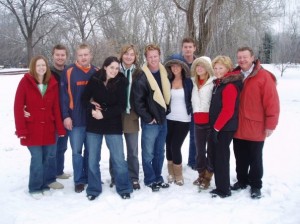If a good day is 0 and a bad day is 10, today was an 8. En route to the hospital in Chicago, Nate called the doctor, wanting to set up a meeting after today’s radiation treatment (#10). In the last two days, new negative symptoms have popped up: dry heaving, dizziness and feelings of panic as breathing tightens.
Two doctors and a nurse kindly accommodated and gave us a full hour, despite our not being scheduled. When they asked Nate to rate his pain from 1 to 10, 10 being the most severe, he thought and frowned but couldn’t pick a number. The description beneath face #8 said it well: “Hurts a whole lot.” The medical team designed a new treatment plan to ease his symptoms and suggested we meet with the hospital counselor specializing in cancer cases.
The doctor described what he saw as the cause of Nate’s panic attacks, the conflict of being forced to choose between two bad choices. With the end of our radiation treatments in sight, chemotherapy was coming into view. “Chemo might help you, but it also will drain your energy,” the doctor was saying. Basically the question in front of us was, “Would you like to undergo chemo treatments that may not help you, or would you like to forego chemo and risk losing the help it may have given you?”
We’d already decided against the research study to see how using a new combination of chemo drugs in pancreatic cancer patients might help. But traditional chemo was still on the table for us. What would our choice be?
During the discussion, Nate was battling extreme emotional pain, maybe even a 10. It was written in the agony on his face. His dry mouth was causing his lips to stick to his teeth, and he was complaining of a severe stomach ache. Dr. Abrams prescribed something to relax him, agreeing that he needed relief and calming. He wisely suggested we opt out of our scheduled radiation treatment today after observing Nate’s overall stress and exhaustion, so we skipped it.
After our appointment, my brother Tom met us in the radiation waiting room to talk about their legal clients as he and Nate had done before. But today Nate couldn’t concentrate and was agitated in both body and mind. Tom called a halt to the meeting, having a sensitive barometer for his brother-in-law’s well being, and we headed home by way of two pharmacies. Arguments over insurance permission, pill prices and inadequate supplies left us both longing to end the day.
Finally, armed with a small supply of a new drug to ease Nate’s anxiety, we looked forward to a calm, symptom-free evening. But the pill overdid its task and knocked him out completely. He went to sleep in his clothes, a sleep so solid I wondered if he’d wake up in the morning. Tears, tears and more tears came as I watched him sleep next to me, his mouth open and his eyes only half closed.
When Jesus walked the earth, one of his statements summed up the way we would have to have to look at life from here on: “Do not worry about tomorrow; for tomorrow will care for itself. Each day has enough trouble of its own.”
People often say, “Tomorrow will be a better day.” I have a hunch that won’t be true for us. Although we never lose hope, probabilities are powerful influencers.


